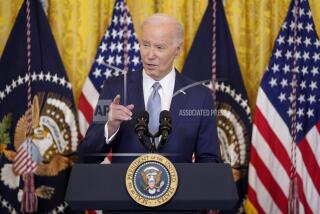Texas Suspends Drinking Curbs
HOUSTON — In a state where distances were once measured not in miles but in six-packs, a systematic crackdown on public drunkenness in bars has turned into a Texas-size headache.
For months, undercover agents with the Texas Alcoholic Beverage Commission have been scouting bars and arresting or issuing citations to people who were fall-down drunk. The program, designed to cut down on drunk driving, was little noticed until March when -- during a sweep of Dallas-area bars -- two people were arrested for public intoxication at a hotel.
The well-publicized incident spurred scores of Texans to ask state legislators why a person might be jailed for drinking in a licensed bar if he or she has no plans to drive.
Convention boards and chambers of commerce, worried the program would drive away tourists and hurt the economy, prepared to do battle. Editorial writers commented on an unsettling image of state agents lurking in lounges to monitor a person’s drinking habits.
As criticism mounted, the commission refused to halt the surveillance. But on Wednesday, it announced the program had been suspended, at least until a state legislative committee holds a hearing on the matter Monday.
“Some of this reaction has been driven by economic concerns,” said Democratic state Sen. John Whitmire, chairman of the Criminal Justice Committee. “I personally think it’s a good tool to prevent DWIs. But if you have selective or poor judgment on the part of law enforcement, we won’t stand for it.”
The state alcohol commission has been conducting the stings since 2001, but intensified its efforts last fall after getting funding from the Texas Legislature to hire about 100 new employees.
The operation focuses on people who appear obviously drunk and the bartenders who continue to serve them. In the six months ending in February, the commission issued 2,281 arrests or citations for public intoxication, for continuing to serve an intoxicated person and for serving those who are underage.
That is a 95% increase from the same period a year ago. Those arrested had an average blood-alcohol level of 0.17%, more than twice the legal limit for driving, commission spokeswoman Carolyn Beck said.
In 2004, Texas had 1,642 alcohol-related traffic fatalities, according to Mothers Against Drunk Driving. The state defines public intoxication as being so drunk you’re a danger to yourself or to others; it is a class C misdemeanor punishable by a fine of up to $500.
Alcohol commission agents use their judgment to determine when drunk is too drunk, Beck said. “You do go to a bar to drink and we have no problem with that. We’re looking for people so drunk they lose the ability to make good decisions and create unsafe situations.”
As an example, she said one of the people arrested at the hotel near Dallas was a woman who took off her shirt and shook her bikini-clad breasts.
“She told us she was too drunk to perform a standard field sobriety test,” Beck said. “She told us she was drunk and looking for sex. There was no evidence of a responsible party we could release her to.”
Phillip Jones, president of the Dallas Convention and Visitors Bureau, said that after the arrests, he received calls from meeting planners concerned that hard-partying conventioneers would be arrested by Texas undercover officers.
Though initially critical of the program, Jones said, he has since been assured by the alcohol commission that visitors will not be targeted. “People can come to Texas and not be worried they will be arrested as long as they’re not publicly intoxicated,” he said
Sen. Whitmire said obnoxious drunks were the ones who should be concerned. “If you’re sitting there minding your own business and having a drink, you have nothing to worry about,” he said.
More to Read
Sign up for Essential California
The most important California stories and recommendations in your inbox every morning.
You may occasionally receive promotional content from the Los Angeles Times.










